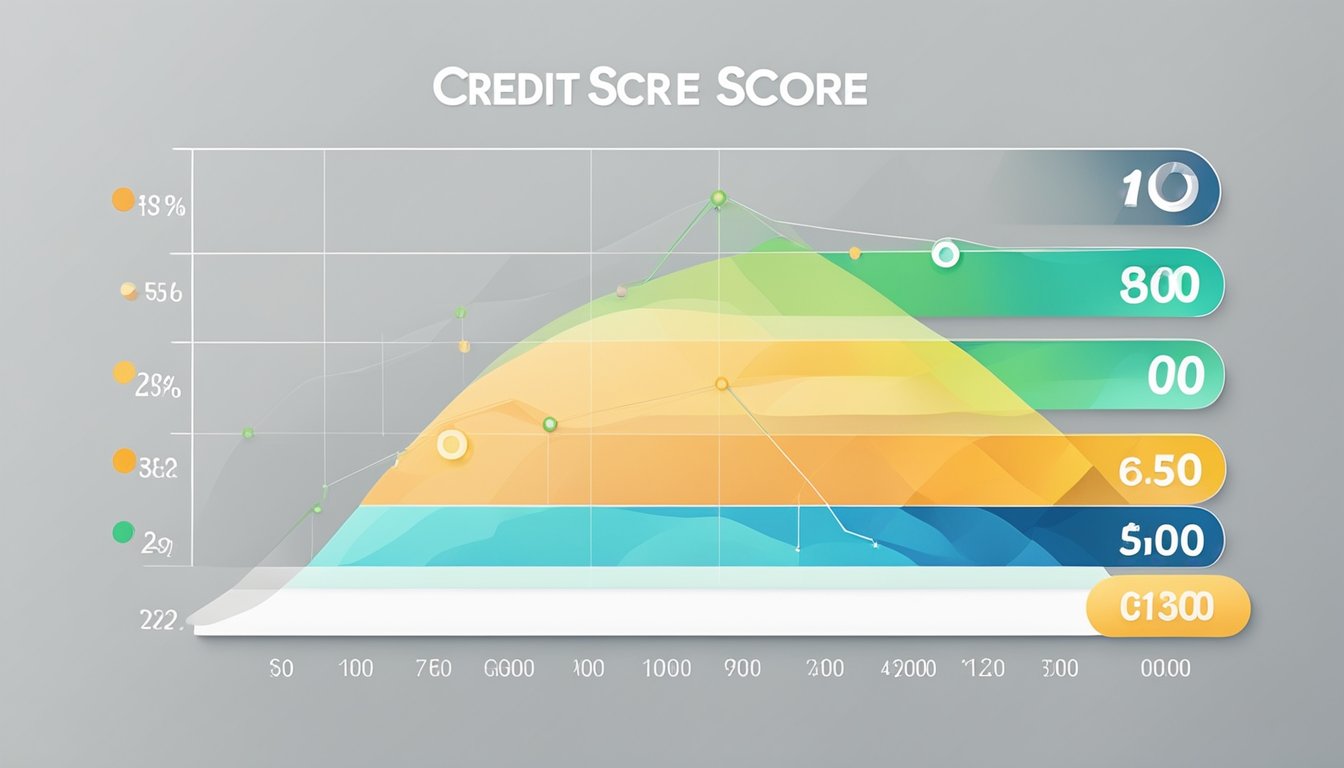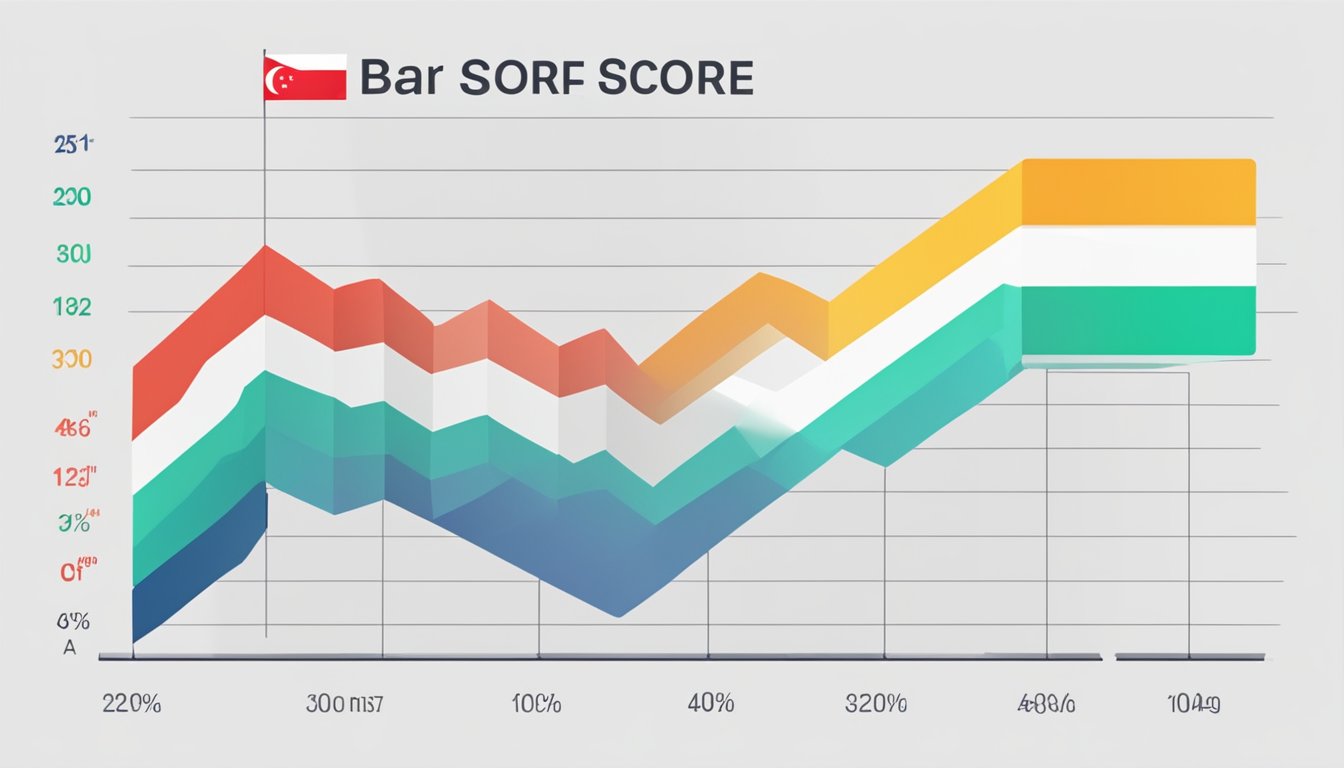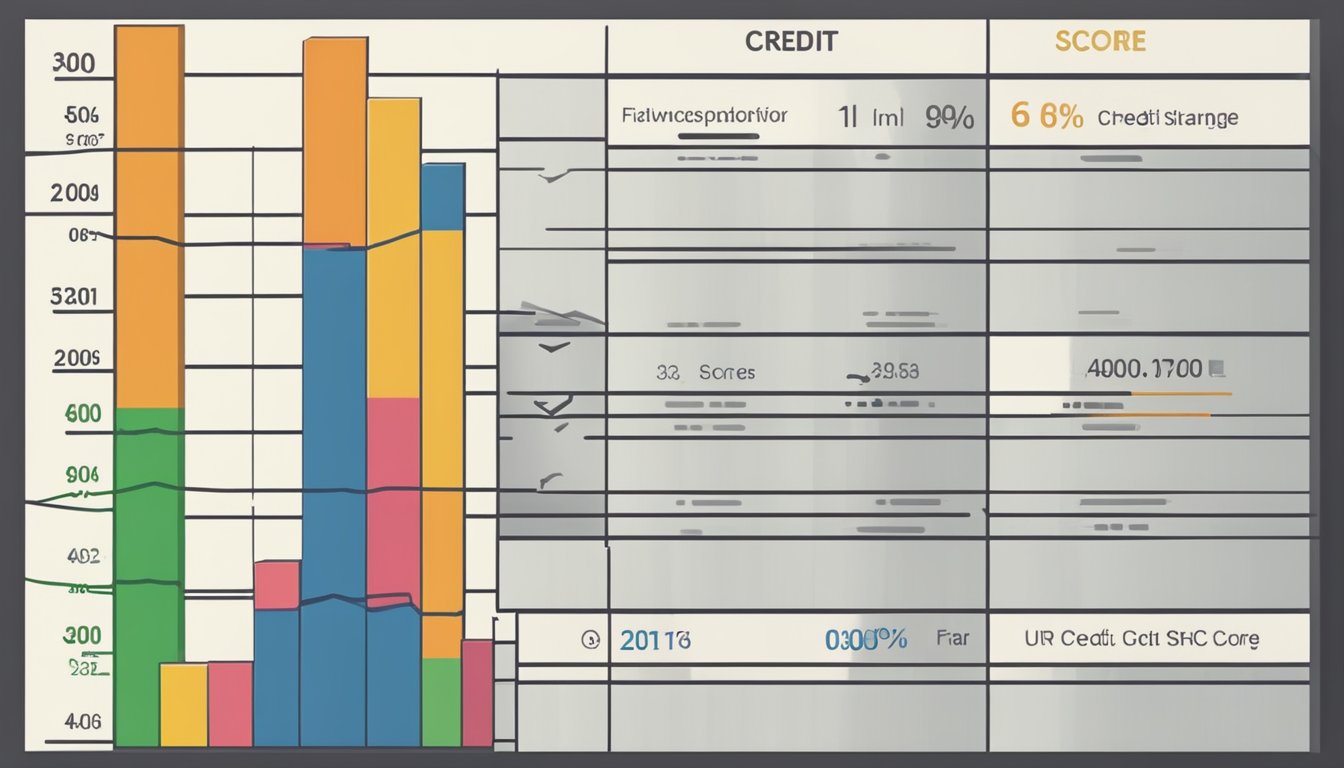Introduction:

Understanding credit scores is important if you are looking to borrow money in Singapore. A credit score is a numerical representation of your creditworthiness, and it is used by financial institutions to determine your eligibility for loans and credit cards. A good credit score can help you secure better interest rates and loan terms, while a poor credit score can limit your options and lead to higher costs.
Factors Influencing Your Credit Score:
Several factors affect your credit score in Singapore. Payment history is one of the most critical factors, as it shows how well you have managed your debts in the past. The amount of credit you owe, the length of your credit history, and the types of credit you use also play a role in determining your credit score. New credit applications can also impact your score, as multiple applications within a short period can signal financial distress.
Interpreting the Credit Score Range:
In Singapore, credit scores range from 1,000 to 2,000, with a higher score indicating lower credit risk. A score of 1,844 to 2,000 is considered good, while a score below 1,500 is considered poor. It is essential to monitor your credit score regularly and take steps to improve it if necessary. By maintaining a healthy credit score, you can increase your chances of securing financial opportunities and achieving your financial goals.
Key Takeaways
- Your credit score is a numerical representation of your creditworthiness and is used by financial institutions to determine your eligibility for loans and credit cards.
- Payment history, the amount of credit you owe, the length of your credit history, the types of credit you use, and new credit applications all affect your credit score in Singapore.
- A score of 1,844 to 2,000 is considered good, while a score below 1,500 is considered poor. Monitoring your credit score regularly and taking steps to improve it can increase your chances of securing financial opportunities.
Understanding Credit Scores in Singapore

If you’re looking to apply for a loan or credit card in Singapore, it’s important to understand what a good credit score is. Your credit score is a three-digit number that represents your creditworthiness, and it plays a significant role in determining whether lenders will approve your credit application.
Components of a Credit Score
Your credit score is calculated based on several factors, including your credit history, the amount of credit you owe, the length of your credit history, the types of credit you have, and your recent credit applications. These factors are used to determine your credit grade, which ranges from AA to HH.
Your credit grade is an indicator of your creditworthiness, with AA being the highest and HH being the lowest. A higher credit grade means that you’re less likely to default on your credit obligations, while a lower credit grade means that you’re more likely to default.
Credit Bureau Singapore (CBS) Overview
The Credit Bureau of Singapore (CBS) is the main credit reporting agency in Singapore. It collects credit information from various sources, including banks, finance companies, and credit card issuers, and uses this information to calculate your credit score.
In Singapore, credit scores range from 1000 to 2000, with a higher score indicating lower credit risk. An excellent credit score in Singapore typically falls in the range of 1911 to 2000, while a poor credit score is generally below 1400.
It’s worth noting that different lenders may have different credit scoring systems, so your credit score may vary depending on the lender you’re applying to. However, having a good credit score is always beneficial, as it can increase your chances of getting approved for credit and getting better interest rates.
Overall, understanding your credit score is essential for managing your finances and making informed credit decisions. By keeping track of your credit score and taking steps to improve it, you can increase your chances of getting approved for credit and achieving your financial goals.
Factors Influencing Your Credit Score

Your credit score is a numerical representation of your creditworthiness. It is important to maintain a good credit score as it can affect your ability to get approved for loans, credit cards, and other financial products. Here are some factors that influence your credit score:
Payment History
Your payment history is the most important factor that affects your credit score. It shows how consistently you have made payments on your credit accounts. Late payments, missed payments, and defaults can have a negative impact on your credit score. On the other hand, making on-time payments can help improve your credit score.
Credit Utilisation Ratio
Your credit utilisation ratio is the amount of credit you are using compared to the amount of credit available to you. It is recommended to keep your credit utilisation ratio below 30%. High credit utilisation can indicate that you are relying too much on credit and may not be able to handle additional debt.
Length of Credit History
The length of your credit history is the amount of time you have been using credit. A longer credit history can indicate that you have more experience managing credit and can help improve your credit score. However, a short credit history does not necessarily mean you have a bad credit score.
Credit Mix and New Credit Applications
Your credit mix refers to the different types of credit accounts you have, such as credit cards, loans, and mortgages. Having a diverse credit mix can indicate that you can handle different types of credit and can help improve your credit score. Additionally, applying for new credit can also affect your credit score as it can lead to multiple credit inquiries, which can indicate that you are taking on too much credit at once.
In summary, maintaining a good credit score requires consistent on-time payments, keeping your credit utilisation ratio low, having a diverse credit mix, and being cautious when applying for new credit. By understanding the factors that influence your credit score, you can take steps to improve your creditworthiness and increase your chances of getting approved for loans and credit cards.
Interpreting the Credit Score Range

When it comes to understanding your credit score in Singapore, it’s important to know what the score range means and how it impacts your creditworthiness. The Credit Bureau of Singapore (CBS) calculates credit scores based on several factors such as payment history, amount of credit owed, length of credit history, types of credit in use, and new credit applications. The score ranges from 1000 to 2000, with a higher score indicating lower credit risk.
Risk Grades and Creditworthiness
The Bureau Score ranges from 1000 to 2000, and it’s divided into ten risk grades from AA to HH. The lower the Bureau Score, the higher the probability of default. An AA rating is the highest rating you can receive, indicating a low risk of default. On the other hand, an HH rating is the lowest rating you can receive, indicating a high risk of default.
Here’s a table that shows the risk grades and their corresponding creditworthiness:
| Risk Grade | Creditworthiness |
|---|---|
| AA | Excellent |
| BB | Very Good |
| CC | Good |
| DD | Fair |
| EE | Poor |
| FF | Very Poor |
| GG | Extremely Poor |
| HH | High Risk |
What Constitutes a Good Credit Score?
According to Singapore’s credit scoring system, a good credit score typically falls between 1,844 and 2,000. This range assesses a person’s likelihood of failing to pay their debts. If you have a score of at least 1,844, it shows that you’re a trustworthy borrower who will not skip payments.
Having a good credit score is essential when applying for credit, such as a loan or credit card. A good credit score shows that you’re responsible with your finances, and lenders are more likely to approve your application. Moreover, a good credit score can help you get better interest rates, which can save you money in the long run.
In conclusion, understanding your credit score range and what constitutes a good credit score is crucial for maintaining a healthy credit rating. By paying your bills on time, keeping your credit utilization low, and avoiding new credit applications, you can improve your credit score and increase your creditworthiness.
Improving and Maintaining a Healthy Credit Score

Having a good credit score is crucial for financial stability and success. It not only allows you to access loans and credit cards easily, but it also determines the interest rates you pay. Therefore, it’s essential to maintain a healthy credit score. Here are some strategies to enhance your credit score and avoid common credit mistakes.
Strategies to Enhance Credit Scores
-
Pay your bills on time: Late payments can negatively impact your credit score. Therefore, make sure you pay your credit card bills, personal loans, and other debts on time.
-
Keep your credit utilization low: Credit utilization refers to the percentage of your credit limit that you’re using. It’s recommended to keep it below 30% to maintain a healthy credit score. If you have a high credit utilization rate, consider paying off your debts or increasing your credit limit.
-
Monitor your credit report: Check your credit report regularly to ensure that there are no errors or fraudulent activities that can harm your credit score.
-
Diversify your credit: Having a mix of credit types, such as credit cards, personal loans, and mortgages, can positively impact your credit score.
-
Seek credit counselling: If you’re struggling with debt, consider seeking credit counselling. A credit counsellor can help you create a debt management plan and improve your credit score.
Avoiding Common Credit Mistakes
-
Maxing out your credit cards: Maxing out your credit cards can harm your credit score. Therefore, it’s crucial to keep your credit utilization rate low.
-
Closing old credit accounts: Closing old credit accounts can reduce your credit history, which can negatively impact your credit score. Therefore, it’s recommended to keep your old credit accounts open, even if you’re not using them.
-
Applying for too many credit cards: Applying for too many credit cards in a short period can harm your credit score. Therefore, it’s essential to apply for credit only when you need it.
By following these strategies and avoiding common credit mistakes, you can improve and maintain a healthy credit score. Remember, a good credit score is essential for financial health and stability.
The Impact of a Credit Score on Financial Opportunities

Your credit score is a crucial factor that determines your financial opportunities. It is a numerical representation of your creditworthiness, which lenders use to assess your ability to repay loans. A good credit score can increase your chances of getting approved for loans, while a poor credit score can reduce your borrowing capacity.
Credit Score and Loan Eligibility
Your credit score is one of the primary factors that lenders consider when assessing your eligibility for loans. A high credit score indicates that you are a low-risk borrower, while a low credit score implies that you are a high-risk borrower. If you have a good credit score, you are more likely to get approved for loans, including personal loans, home loans, renovation loans, and education loans. However, if you have a poor credit score, you may find it challenging to get approved for loans, or you may be offered loans with higher interest rates and stricter terms.
Interest Rates and Credit Scores
Your credit score also affects the interest rates that lenders offer you. If you have a good credit score, you are more likely to get approved for loans with lower interest rates. On the other hand, if you have a poor credit score, you may be offered loans with higher interest rates, which can increase your borrowing costs significantly. For example, if you have a credit score of 800 or above, you may be offered home loans with an interest rate of around 1.5% per annum. However, if you have a credit score of 600 or below, you may be offered home loans with an interest rate of around 2.5% per annum. This difference in interest rates can result in significant savings or expenses over the loan’s tenure.
In conclusion, your credit score plays a vital role in determining your financial opportunities. It affects your eligibility for loans and the interest rates that lenders offer you. Therefore, it is crucial to maintain a good credit score by paying your bills on time, keeping your credit utilization ratio low, and avoiding defaulting on loans. By doing so, you can increase your chances of getting approved for loans with favourable terms and lower interest rates, which can help you achieve your financial goals.
Frequently Asked Questions

How can I boost my credit score to secure top-notch deals in Singapore?
If you’re looking to improve your credit score, there are a few things you can do. First, make sure you’re paying your bills on time. Late payments can negatively impact your credit score. Second, keep your credit utilization low. This means not using all of the credit that’s available to you. Third, make sure you have a good mix of credit types, such as credit cards, loans, and mortgages. Finally, check your credit report regularly to make sure there are no errors.
What’s the impact of my financial habits on my credit score in the Lion City?
Your financial habits can have a big impact on your credit score in Singapore. Late payments, high credit utilization, and defaulting on loans can all lower your score. On the other hand, paying your bills on time, keeping your credit utilization low, and having a good mix of credit types can all improve your score.
Curious about your credit rating? Discover how to check it for free in Singapore!
You can check your credit report for free in Singapore once a year through the Credit Bureau of Singapore (CBS). Simply visit their website and follow the instructions to request your report. It’s important to check your report regularly to make sure there are no errors or fraudulent activity.
Is a BB rating the key to unlocking financial opportunities in Singapore?
Your credit score is just one factor that lenders and financial institutions consider when deciding whether to approve you for a loan or credit card. While a good credit score can certainly help, it’s not the only thing that matters. Lenders will also look at your income, employment history, and other factors when making a decision.
Ever wondered if a 653 score will hold you back in Singapore’s credit scene?
While a score of 653 is not considered excellent, it’s also not terrible. It’s important to remember that your credit score is just one factor that lenders consider. If you have a steady income and a good payment history, you may still be able to qualify for loans and credit cards with a score of 653.
How long before my credit slate is wiped clean of bad scores in Singapore?
In Singapore, negative information such as late payments and defaults can stay on your credit report for up to 5 years. However, the impact of these negative marks on your credit score will decrease over time as long as you continue to make on-time payments and maintain a good credit utilization ratio.




